Hard Times
From London, A Caesar In Chains
In the teeming yard of an English prison, a convict named Brutus tries to get the attention of a gang of joggers. He speaks of love and honor and fairness, finally winning their approval with a simple question: "Had you rather Caesar were living and die all slaves," he asks them, "than that Caesar were dead, to live all free men?" From the vantage of the prison yard, a single death is a small price for freedom. But as Brutus and his throng soon learn, the transaction is not so simple.
This all female production, directed by Phyllida Lloyd, is set in a women's prison, and uses that harsh setting to remake itself into a meditation on the nature of freedom.
The Donmar Warehouse's Julius Caesar premiered in London last December, and has been imported to Brooklyn to play in a warehouse of our own: St. Ann's, a half a block from the East River in Dumbo. This all female production, directed by Phyllida Lloyd, is set in a women's prison, and uses that harsh setting to remake itself into a meditation on the nature of freedom. Compelling but flawed, it is a fine example of the benefits and drawbacks that come with using Shakespeare to make a point about something larger than the play itself.
This Caesar is built around set pieces—some bloody, some sublime, some accompanied by screaming speed metal. Caesar (Frances Barber) isn't just murdered—he is shoved into the front row to have bleach poured down his throat and a camera shoved into his face, much to the surprise of the startled audience member sitting alongside. In his eulogy for the would-be dictator, Mark Antony (the wonderfully named Cush Jumbo) doesn't just win over the crowd—he mesmerizes them, conducting their awed response with gentle movements of his hand.
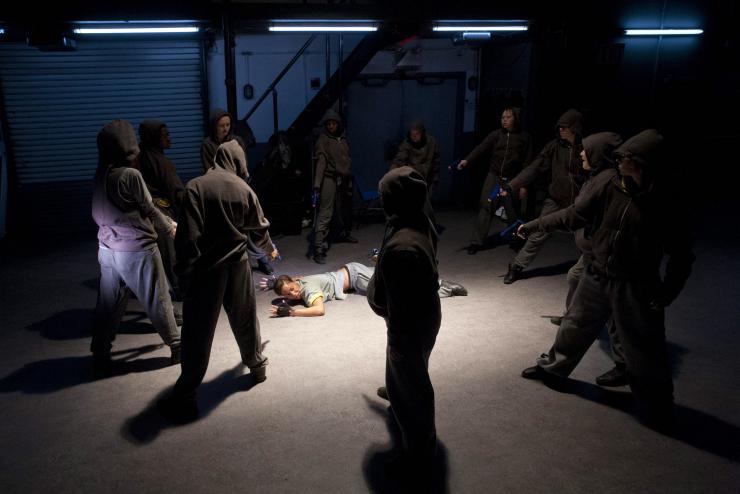
These are lovely moments, simple and effective and buoyed by the remarkable performances of Jumbo and Harriet Walter, whose Brutus has the menace of a stern-faced civil servant on the verge of a violent breakdown. But there are moments when the production overwhelms the actors—for instance, in battle scenes that are nothing more than screeching guitar and projected static, and in an incoherent dream sequence when the soothsayer (Carrie Rock) tootles around the stage on a tricycle, straining to look creepy.
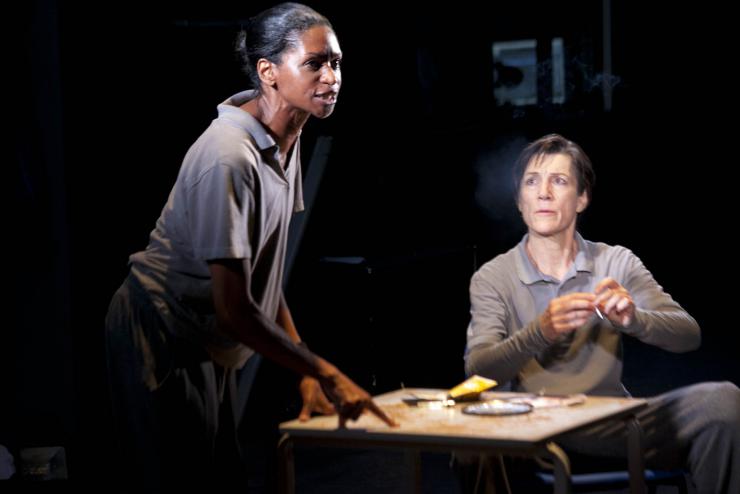
That Brutus and his fellow conspirators are played by women is beside the point, and there is no attempt to inject femininity into Shakespeare’s least-friendly female play. It was nice to see talented women take on some of the juiciest speeches in the canon—Walters particularly seemed to relish the opportunity—but beyond that, it was easy to forget gender. (The critics of London’s reactionary Telegraph had a little bit more trouble.) The women’s prison is established from the moment we enter the lobby, and the appearance of female inmates is not jarring. It’s the setting that proves the problem.
It is hard to imagine a cell to be a villa, or to picture the deliberations of the Senate happening in a prison multi-purpose room, and Phyllida Lloyd does not bother trying to convince us.
Julius Caesar is grounded in its location like few of Shakespeare's plays. It is hard to imagine a cell to be a villa, or to picture the deliberations of the Senate happening in a prison multi-purpose room, and Phyllida Lloyd does not bother trying to convince us.
For the first half of the play, I found myself unable to get a grip on the setting. Yes, it took place in a prison. The ushers dressed as guards, the security cameras, even the hard plastic seats—which I have complained about elsewhere—made that quite clear. But why, after the profanity-heavy opening scene, do the prisoners speak strictly in Shakespearean verse? When the prisoners riot and kill, where are the guards? Why do the convicts threaten each other with blue plastic guns instead of shivs, and why do they have such freedom of movement in the prison after nightfall? In short, where in the hell is this taking place?
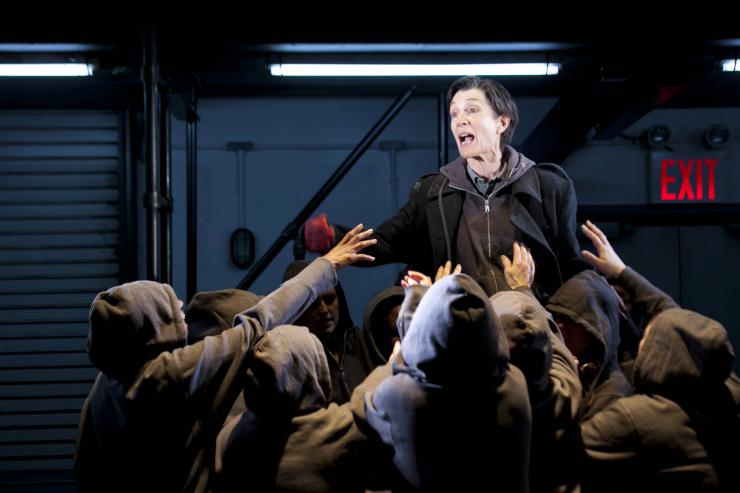
The reason for this seemingly bewildering approach becomes clear in Act III, Scene III, with the appearance of Cinna the poet. As the poor doomed scribe starts in with "I dreamt tonight that I did feast with Caesar," a guard enters, and takes the actress away. Her place is taken by another; a fearful understudy who lurches through the speech, script in hand, until her fellow inmates attack her for stumbling over her dialogue. Her nose bloodied, she is saved by Caesar—the same Caesar murdered a few minutes prior, now revealed as the director of a prison production of the play. The nature of what we are watching comes into focus so suddenly, and satisfyingly, that at the performance I saw, the audience burst into scattered applause.
It's a wonderful reversal, and while withholding the premise of a production for more than an hour could be called gimmicky, I was engaged enough by the first half to not be bothered. Julius Caesar is an irresistible show, loaded with speeches and violence and music, and Lloyd's hand is steady enough that she is never in danger of breaking the play. But her metatheatrical twist drops a wall between the audience and Shakespeare's characters which her actors, despite brave effort, are never able to break down.
The reversal undercuts much of what we have already seen. Caesar's death, Antony's grief, Brutus's escalating guilt—all are suddenly secondary to the plight of the performers themselves. I was fully ready to set aside the play's main narrative in order to feel something for the inmates performing it, but Lloyd does not do enough to capitalize on her twist. The text is rife with talk of freedom and tyranny—clear chances to explore the connection between the prisoners and their text—but Lloyd bypasses these opportunities. We are left alienated from Shakespeare's characters, and in the dark about the inmates portraying them.
We are left alienated from Shakespeare's characters, and in the dark about the inmates portraying them.
One of my favorite moments in Julius Caesar comes near the end, when the slave Pindarus wins freedom by helping his master commit suicide. "So, I am free," he says, and tells his dead master that "Far from this country Pindarus shall run, where never Roman shall take note of him."
I've always been charmed by the fact that, in the heat of the final battle, the play devotes a few lines to a character so minor that the actress playing him (Jade Anouka) has time to play three other parts as well. Given the opportunity to eulogize his dead master, Pindarus doesn't bother. He clears out, ready to enjoy his freedom in a way the inmates on stage cannot. The play has already stopped to give Pindarus his moment in the spotlight, and it would take only a slight push to contrast his burst of joy with the prisoners' plight, but Lloyd makes nothing of the moment.
As soon as the play is revealed as a prison production, we know how it will end. At some point, the lights will come on, the guards will enter, and the actors will be led back to lockup—Antony and Cassius and Brutus stuck together in a cell block, powerless and voiceless. Caesar is revealed to be a guard, and prison a place where freedom comes only for an hour or two at a time. Caesar is living, and the actors remain in chains. It is a chilling ending, but one that comes at the expense of the story of Julius Caesar. Lloyd and her actors are talented enough that the trade is almost worth making—but only for those who prefer a Caesar that plays on the head, and never the heart.


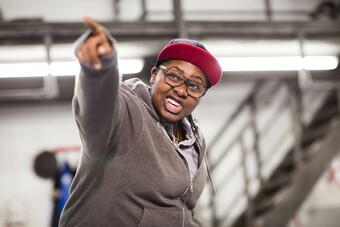

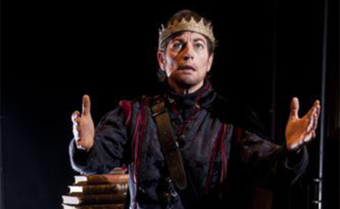

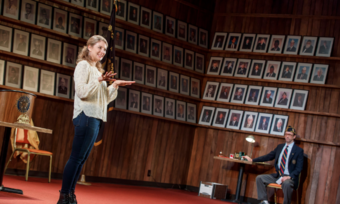

Comments
The article is just the start of the conversation—we want to know what you think about this subject, too! HowlRound is a space for knowledge-sharing, and we welcome spirited, thoughtful, and on-topic dialogue. Find our full comments policy here